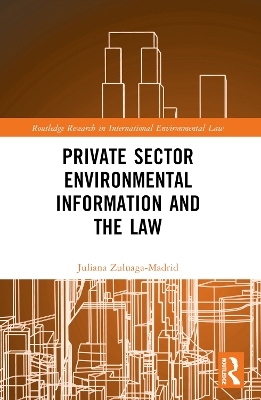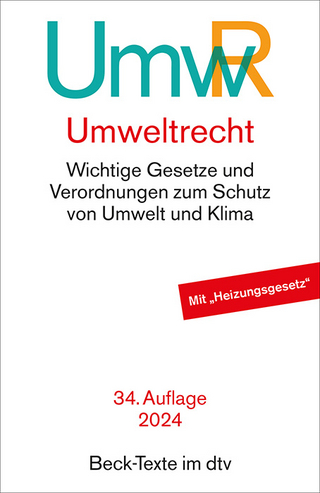
Private Sector Environmental Information and the Law
Routledge (Verlag)
978-1-032-31014-5 (ISBN)
- Lieferbar (Termin unbekannt)
- Versandkostenfrei innerhalb Deutschlands
- Auch auf Rechnung
- Verfügbarkeit in der Filiale vor Ort prüfen
- Artikel merken
Current advancements in civil rights and environmental activism emphasize the crucial importance of making environmental information widely available to the public, regardless of whether it is in the hands of the government or of corporations, especially when the information is needed to understand and prevent risks for human health and the environment. In the wake of a resurgence of environmental and civil rights activism, conflicts flare between the right of the people to know and the right of private actors to keep certain information hidden, mostly for commercial reasons. This book offers a detailed comparative analysis of how environmental information is being accessed in different countries and jurisdictions, and how these issues are currently being handled by judges and governments. Focusing on the right of access to environmental information held and produced by private actors and the legal issues that emerge when other values and rights are compromised, this book offers an alternative framework to improve on current legal systems, suggesting a more nuanced and balanced approach that takes both set of interests duly into consideration. Providing an integrated approach to public environmental law and private commercial law, the book integrates the arguments from both sides to establish a common ground, defining shared principles and models that provide a solid basis for a robust new system. Reviewing access to private sector information at a truly international level, this book will be relevant to students, academics and practitioners working in these areas.
Juliana Zuluaga-Madrid holds a PhD in Law and an LLM in Energy and Environmental Law. She has worked for companies in the mining sector, Oil & Gas and is currently Legal Director at INGEMA S.A, a company in the energy sector. She combines her legal practice with academic engagements as lecturer and research advisor for Universidad del Rosario (Bogotá).
Acknowledgements
List of acronyms and abbreviations
Introduction
Why now?
Background and scope
Normative Framework
Preliminary Notions of the Right to Know and the Private Sector
Legal and Historical Precedents of Access to Environmental Information
Transition to democratic state models
The transparency trend
‘Information governance’ and environmental reform
The evolution of human rights theory
Fundamental notions of Private Entities
Public v Private
Definition of Private Entities
Public and Private Information
The protection of business confidentiality
The Aarhus Convention: Fundamental concepts and contribution
Environmental Participation under Aarhus
Contribution and innovative features
Characterisation of the Right to Access Environmental Information
Recognition of the right to information as a human right
The Right to Access Environmental Information in International Law
Influence of International Law in regional and national jurisdictions
Statutory and constitutional recognition of the right to information
The right of access to environmental information at national level
Systems for public participation in environmental matters
Scope of the Laws providing Access to Information
Scope of beneficiaries: Is access to information provided without discrimination and without having to state an interest?
Material scope: What information can be accessed?
Data, information and knowledge
Restrictions based on format
The definition of ‘Environmental Information’
Access to ‘relevant’ environmental information in decision-making processes
Scope of obligated subjects
Scope of exempted information
Access to Private Sector Environmental Information
Why increase access to private sector environmental information?
Indirect access through public authorities
Active disclosure: from the private duty to report to the public obligation to inform
Passive access: Indirect access by request to a public authority
Direct access to environmental information held by private entities
Private entities included in the definition of ‘public authorities’
Private entities not included in the definition of ‘public authorities’
Private entities active disclosure
The Protection of Trade Secrets and ‘Confidential Business Information’
Why is business confidentiality worthy of protection?
Defining ‘confidential business information’
The logic behind the protection of CBI
Trade secrets as property
Trade secrets as Intellectual Property
Trade secrets as Human Rights
Statutes for the protection of CBI
Trade secrets under international law
CBI protection and national level
CBI not qualifying as trade secrets or IP
Types of CBI and trade secrets with special protection
Protection of CBI and trade secrets via exceptions to disclosure
Access to information about emissions into the environment according to the CJEU
Problems of the System for Access to Private Sector Information
Shortcomings of the public/private divide for access to environmental information
No clear criteria to assimilate private entities to public authorities
Deficiencies of corporate transparency
The organic focus of access laws
Overlapping between the definitions of ‘environmental information’ and ‘confidential business information’
Cost-benefit analysis and other financial information
Technical information about hazardous activities or products
Chemical substances
Health and safety data
Environmental Impact Assessments and other relevant information on specific projects
Geotechnical information and natural resource’s locations
Inconsistencies in the applicable laws
The current toolbox for solving conflicts between access to environmental information and the protection of CBI
Proposal to Reform Access to Environmental Information
Matrix of Values
Integrated contextual analysis instead of ‘balancing of interests’
Conclusions and Recommendations
Colombia
The US
The EU
| Erscheinungsdatum | 05.08.2023 |
|---|---|
| Reihe/Serie | Routledge Research in International Environmental Law |
| Zusatzinfo | 6 Tables, black and white |
| Verlagsort | London |
| Sprache | englisch |
| Maße | 156 x 234 mm |
| Themenwelt | Recht / Steuern ► EU / Internationales Recht |
| Recht / Steuern ► Öffentliches Recht ► Umweltrecht | |
| Recht / Steuern ► Privatrecht / Bürgerliches Recht ► IT-Recht | |
| Recht / Steuern ► Wirtschaftsrecht ► Gesellschaftsrecht | |
| ISBN-10 | 1-032-31014-6 / 1032310146 |
| ISBN-13 | 978-1-032-31014-5 / 9781032310145 |
| Zustand | Neuware |
| Informationen gemäß Produktsicherheitsverordnung (GPSR) | |
| Haben Sie eine Frage zum Produkt? |
aus dem Bereich


